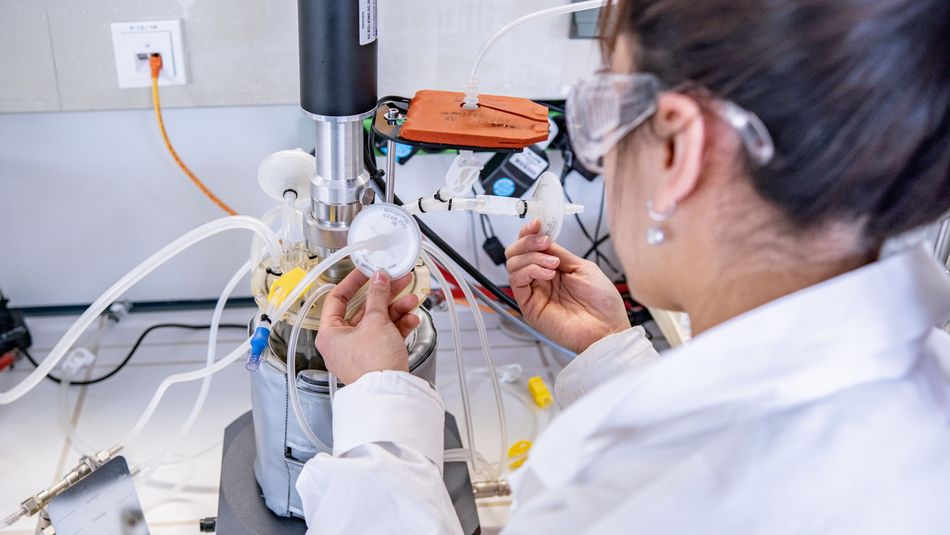
Do you want to make a contribution to the fight against diseases integrated into a company? The focus of the study programme "Biopharmaceutical Drug Manufacturing - dual (B. Eng.)” is on the safe supply of established medicines and vaccines as well as new biotechnological active substances. An ingeniously new, practice-integrating study programme concept precisely integrated into cooperating companies.
Degree
Bachelor of Engineering (B.Eng.)
Beginning of the course
winter semester
Standard period of study
7 semesters (210 ECTS)
Admission restriction (N.C.)
none
Place of study
Environmental Campus Birkenfeld
Practice
practical phases, practical study phase
Internationality
semester abroad (voluntary)
Tuition fee
none (only semester fee)
The study programme "Biopharmaceutical Drug Manufacturing - dual (B. Eng.)" offers an exceptional practice-integrating study model. The hallmark of the dual study model is that practical training takes place in a company (e.g. on the basis of an internship or working student contract) in parallel to the study programme. This is facilitated by a cooperation between the Environmental Campus Birkenfeld and industrial partners.
The labour market urgently needs specialists now and in the future who can produce (in laboratories) newly developed medicines or vaccines quickly and in sufficient quantities. The fact that a rapid transfer from the laboratory to technical production is the key to saving human lives is well illustrated by the example of the Covid vaccines. However, it also became clear that there are too few graduates with the appropriate knowledge and skills. Successful graduates of the "Biopharmaceutical Drug Manufacturing - dual (B. Eng.)" programme will therefore certainly be able to climb the ladder of success in their company - with excellent salary prospects.
There are still many diseases for which suitable drugs are needed. Cancers are the best example of this. In addition, we have to expect that there will always be new diseases (such as corona) that require vaccines and drugs. Current researches are focusing more and more on biopharmaceutical manufacturing processes, where microorganisms or animal cells are used to produce pharmaceutically active substances (such as antibodies).
The 7-semester Bachelor's programme "Biopharmaceutical Drug Manufacturing - dual (B. Eng.)" qualifies students for a career in precisely this field. The study programme enable them to be taken on as a specialist in pharmaceutical manufacturing by the (cooperating) company directly.
The degree programme imparts a profound knowledge of scientific and technical fundamentals and biopharmaceutical technology. In coordinated modules, students learn the complete biopharmaceutical process chain from the biological production of the pharmaceutically active substance, through its separation from other substances, to the production of the suitable dosage form, such as tablets. Of course, each of us wants medicines or vaccines that are not only effective, but also safe. Quality assurance and cleanliness in production are therefore of central importance. In contrast to similar degree programmes, modules that look at the legal guidelines for quality assurance (GMP) and clean rooms take up a larger share of the study programme here.
As a further qualification, the 3-semester Master's programme "Cleanroom Technology in Pharmaceutical Manufacturing" can then be studied. This course, which leads to the degree of "Master of Engineering", qualifies students for professional activities as managers in the planning, operation, and optimisation of (bio-)pharmaceutical plants.
The Environmental Campus Birkenfeld, a location of Trier University of Applied Sciences, is a very special place to live, learn, and work. It offers its approximately 2,400 students an interdisciplinary course of study at a unique "Zero Emission University", which regularly receives awards as Germany's greenest university and is currently ranked 6th worldwide (see greenmetric.ui.ac.id/). Environmental and sustainability aspects run like a green thread through all the degree programmes offered.
The Bachelor's programme "Biopharmaceutical Drug Manufacturing (B. Eng.)" has three pillars according to the desired qualification, each of which comprises about 1/3 of the modules of the programme. The first pillar is made up of modules that lay the scientific-technical foundations. These include modules from the biological field, such as "Biology and Microbiology (BP)", "Organic Chemistry and Biochemistry", "Molecular Biology and Genetic Engineering I", as well as modules from the technical field, such as "Mass/Heat Transfer and Balances", "Technical Fluid Mechanics" or "Plant Planning and Fluid Handling in Pharmaceutical Processes". The basic modules from the technical area provide technical knowledge, which enable the students to bring the production of a biotechnical active ingredient from the lab scale to industrial scale. Modules such as mathematics and chemistry are also necessary to bring all students up to the same basic understanding. The second pillar is formed by modules that deal with the biopharmaceutical manufacturing process ("process knowledge"). These include "bio-heavy" modules, such as "Bioreaction Technology I", "Bioseparation Processes" or "Bioreaction Technology II and Hygienic Design" and "pharmaceutical-heavy" modules, such as "Down-stream Processing in Pharmaceutical Production I", "Down-Stream Processing in Pharmaceutical Production II" or "Pharmaceutical Technology II". The modules of the third pillar deal with the legal requirements that have to be fulfilled as requirement to produce a drug or vaccine at all. An important technical term here - derived from the US Pharmacopoeia - is Good Manufacturing Practice (GMP). The modules of the third pillar therefore almost always bear the abbreviation GMP in their names. Cleanliness in production is also important for safe medicines and vaccines, so the necessary cleanroom technology is also dealt with in the degree programme. The Bachelor's programme is designed to qualify students for a profession, i.e. it is possible to enter a profession directly with a Bachelor's degree, as the necessary technical depth is taught in all three pillars in the 7 semesters.
You are leaving the official website of Trier University of Applied Sciences